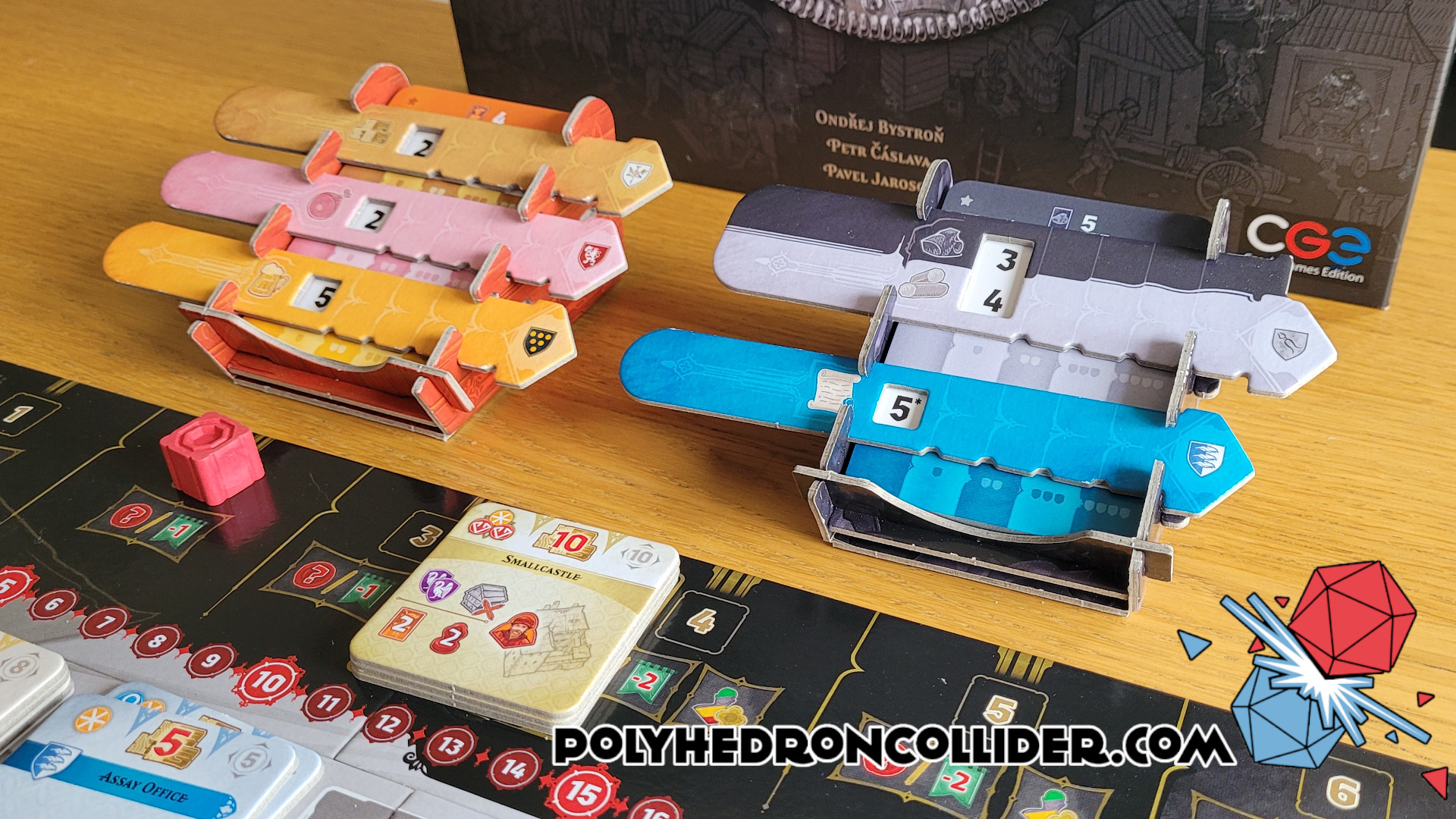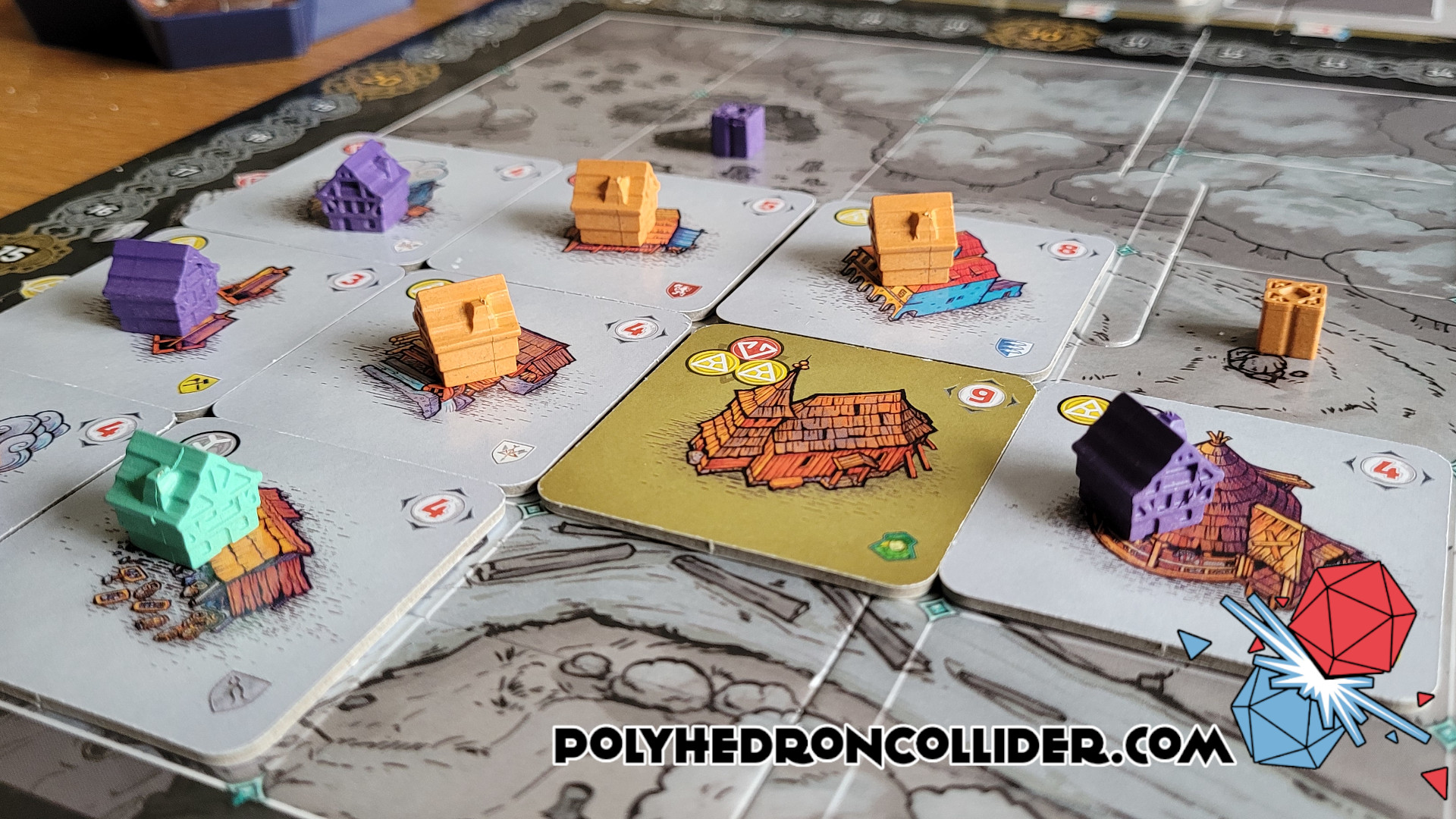Although Kutná Hora is an economic euro game, the game isn’t about money. It’s about working the market. It’s about reading your opponents, being ready to take advantage of an opportunity, and being clever. The real resources in this game are your actions, your timing, and your opponents. This game is both cleverly clever and subtly clever that at the end of the game will leave you feeling very satisfied with the experience (even if you didn’t win).
Players are trying to develop the renaissance city of Kutná Hora, accomplished by digging mines, purchasing writs, plots of land, and constructing buildings, but most importantly, Kutná Hora is about increasing the prosperity of the city.
Straight off the bat, we are going to talk about the production quality of this game. As we covered in Episode 144 of the Polyhedron Collider Podcast, when this game was being demonstrated at the UK Games Expo 2023, the board was primarily a set of Excel tables. Kutná Horá has tremendous table presence: the board is gloss black with gold and silver leaf, plus all the cards have gold and silver leaf along with vivid, vibrant art. The Re-Wood components have a minimalist level of detail and are in high contrast colours of teal, orange and so on that make them pop against all that black and silver (plus they’re eco-friendly).
But the stars of the show are the card holders - these attention-grabbing, cleverly designed, functional “mini-cardboard-computers” are not only great for the look of the game, but are essential in managing the key facet of the game itself. Most actions you’ll take in the game will have an immediate and direct effect on one of the city's five resources, you’ll either increase the supply or the demand. Each time you increase the supply the slider moves to the right and through the window on the bar you see a new price for the resource on the card beneath.
Each new building represents new work opportunities, as the population increases so does the demand for food, timber, and of course, beer. Here, you simply reveal new cards and this naturally increases the prices. As soon as you build a tavern, or a carpenter’s workshop, the demand and price drops to reflect this. It is this ebb and flow of a resource’s “worth” that the whole game, and your strategy, hinges upon. It’s very clever.
The Guilds are one of the especially Clever Things™ that Kutná Hora does, limiting the types of builders each player can control and construct. Depending on the player count, each guild will only be usable by one player (or two in a four-player game*), meaning one player has the monopoly on a resource. This works in two very clever ways. First, it makes you greedy. A resource in high demand is worth a lot of money, and in this game, you are almost tricked into believing that money is the most important thing. Second, it introduces player synergies. All players have, in some way, a symbiotic relationship with the others. Everyone needs something from one of the other players, be that cheap wood, writs, or mining technologies. For the city to truly prosper, the guilds need to “collaborate”.
If the demand/price for timber, or writs is very high, other players won’t be able to construct buildings and forward the economy and so the game stagnates. But it stagnates in reaction to your in-action. Ultimately, if demand for the commodities gets too high the city takes action and forces the market to shift. When these costs are low there will be a flurry of activity as new buildings shoot up and again, affect the economy.
Money, of course, is important in this game, but the truly clever and Subtle Thing™ about Kutná Hora is that building a prosperous city is more important. The greatest rewards are won by those who contribute to that growth, but believe it or not, that is hard to do. This notion is realised in the scoring in the latter rounds by the inclusion of the city's patricians. Once added to the game these tokens drive a very high portion of end-game scoring, awarding points for players who have constructed a variety of buildings, or have invested heavily in the city’s silver mine, or towards building St Barbara's Cathedral.
However, these tokens only come into play when, firstly, a public building is constructed, and secondly, when one player pays for them to join the council. However, I’ve found that the patrician that comes with the public building that aligns well with my guild doesn’t represent my best interest on the council. Thus, other players will take advantage of your expensive building. This mechanism is again, very clever, it gives the players some agency as to what behaviours/strategies will score well and when.
Kutná Hora is brilliantly designed, well-balanced, clever and above all is a fantastically fun game. Each round you’ll be faced with a simple yet agonising decision on just which way up to play a card, or where to put your plot. You’ll be eagerly awaiting just the right time to construct your buildings or to draw down your income and it all feels just ever so slightly out of your control, so when you do pull it all off you feel smug and clever…but that feeling won’t last for long.
You can listen back to Episode 144 on your podcast platform of choice to hear the…let’s call it ‘lively’ discussion of this game.
*I believe the sweet spot for this game is at three players, but if you often play at four players just note that at this player count the game changes slightly in that all of the guilds are managed by two players, which introduces some great and very tight competition. This change is quite significant and the game takes on a different feel, to me, it steps away from the ethos of the game and if I’m being honest, is less special.
This review is based on a full retail copy of the game provided by our sponsor, Kienda.






Necesitaba una forma sencilla de sumar horas y minutos para organizar mejor mis actividades, y encontré esta calculadora que me resultó muy útil; si quieres probarla, haz clic aquí y verás lo fácil que es usarla.
ReplyDelete¡Qué bueno encontrar artículos como este! La regla de tres parece simple, pero a veces nos liamos más de la cuenta. Yo descubrí https://regladetres-online.es y desde entonces la uso cada vez que necesito hacer un cálculo rápido. ¡Súper útil!
ReplyDeletehttps://ga6789r.net/ là nền tảng đá gà trực tiếp hàng đầu, phát trực tuyến các trận đấu quốc tế đỉnh cao. Với giao diện dễ sử dụng, bảo mật cao.
ReplyDeletehttps://daga88.beer/ là nền tảng đá gà trực tiếp hàng đầu, phát trực tuyến các trận đấu quốc tế đỉnh cao. Với giao diện dễ sử dụng, bảo mật cao.
ReplyDeletehttps://dagatructiepc1.org/ là web xem đá gà trực tiếp Thomo từ bồ gà CPC1, CPC2, CPC3, CPC4,... gồm cựa sắt, cựa dao.
ReplyDeletehttps://bancasieuno.net/ là trò chơi giải trí trực tuyến được hàng triệu game thủ yêu thích nhờ lối chơi hấp dẫn.
ReplyDeletehttps://sv388vip.dev/ – Sân chơi đá gà Thomo trực tuyến an toàn, bảo mật cao. Đăng ký nhanh, hỗ trợ đa nền tảng.
ReplyDeleteMit dem Arbeitszeitrechner von arbeitszeitrechner-online.de können Sie Ihre Arbeitszeiten schnell und einfach ermitteln. Geben Sie einfach Start- und Endzeit sowie die Dauer ein...
ReplyDelete